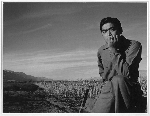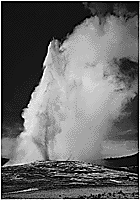I haven't said anything directly about Adm. Poindexter, ret.,
and I'm not going to say a lot now, but I think the time has come
to say something.
First, some background. Admiral Poindexter was the originator
of the Total Information Awareness program, the Policy Analysis
Market (the ill-fated attempt to trade "futures contracts that
deal with underlying fundamentals of relevance to the Middle
East."), and during President Reagan's administration - the
Iran-Contra debacle - the sale of weapons to Iran so that the
profit could be funneled to certain Nicaraguan forces.
All of these programs, in isolation, may have had merits. But
it is this isolation, this firewall between open governance and
his secretive, anti-democratic ideas, that made him so dangerous
to freedom loving Americans.
Why? There are several common threads that run through his
programs. All were hatched as responses to what, I am sure, he
felt were genuine national emergencies that required
extraordinary measures on the part of patriots like, in his
estimation, himself.
I am reminded of the famous speech from the movie A Few
Good Men, which, he probably would have much sympathy, if
not understanding, with:
Jessep (Jack Nicholson): You want answers?
Kaffee (Tom Cruise): I think I'm entitled to them.
Jessep: You want answers?
Kaffee: I want the truth!
Jessep: You can't handle the truth! Son, we live in a
world that has walls. And those walls have to be guarded by men
with guns. Who's gonna do it? You? You, Lt. Weinberg? I have a
greater responsibility than you can possibly fathom. You weep for
Santiago and you curse the Marines. You have that luxury. You
have the luxury of not knowing what I know: that Santiago's
death, while tragic, probably saved lives. And my existence,
while grotesque and incomprehensible to you, saves lives
You don't want the truth. Because deep down, in places you
don't talk about at parties, you want me on that wall. You need
me on that wall.
We use words like honor, code, loyalty...we use these words as
the backbone to a life spent defending something. You use 'em as
a punchline.
I have neither the time nor the inclination to explain myself
to a man who rises and sleeps under the blanket of the very
freedom I provide, then questions the manner in which I provide
it! I'd rather you just said thank you and went on your way.
Otherwise, I suggest you pick up a weapon and stand a post.
Either way, I don't give a damn what you think you're entitled
to!
Kaffee: Did you order the code red?
Jessep: (quietly) I did the job you sent me to do.
Kaffee: Did you order the code red?
Jessep: You're goddamn right I did!!
Secondly, and in relation to the above quote, all three of
these programs assume that the ends justify the means. That it is
proper to take the extreme measure of disregarding the
Constitution in times of; again, in his estimation, great
national peril.
But it is in exactly these perilous times that the
Constitution, and the rights contained therein, is formulated.
For in good times, there would be no need for them. But in bad,
when the fever of pseudo-patriotism overrides all, is when the
shield that is the Constitution against well meaning, but sadly
misguided individuals, is most needed.
Thirdly, all were designed in secret with no opportunity for
public comment or debate. Democracy does not and cannot exist in
secrecy. Yes, I understand that any nation must keep its secrets.
But the secrets are to be kept from its enemies, not its own
people. The secrecy is a weapon against its foreign adversaries,
not against its citizens.
Fourth, all would trade freedom for safety. I believe there
must be balance between the two. Taking either to extremes would
not support democracy. In the first instance, absolute freedom
must assume we have no enemies. Clearly, this is not the case. In
the second instance, absolute safety would require absolute
governmental control.
I also believe the balance may shift back
and forth as forces also shift. But the objective should always
be to maintain the maximum amount of liberty as possible.
In closing, I am further reminded of another speech, not from
a movie, but from one of our great orators and patriots:
No man thinks more highly than I do of the patriotism, as well
as abilities, of the very worthy gentlemen who have just
addressed the house. But different men often see the same subject
in different lights; and, therefore, I hope it will not be
thought disrespectful to those gentlemen if, entertaining as I do
opinions of a character very opposite to theirs, I shall speak
forth my sentiments freely and without reserve.
This is no time for ceremony. The question before the house is
one of awful moment to this country. For my own part, I consider
it as nothing less than a question of freedom or slavery; and in
proportion to the magnitude of the subject ought to be the
freedom of the debate. It is only in this way that we can hope to
arrive at the truth, and fulfill the great responsibility which
we hold to God and our country. Should I keep back my opinions at
such a time, through fear of giving offense, I should consider
myself as guilty of treason towards my country, and of an act of
disloyalty toward the Majesty of Heaven, which I revere above all
earthly kings...
Sir, we are not weak if we make a proper use of those means
which the God of nature hath placed in our power. The millions of
people, armed in the holy cause of liberty, and in such a country
as that which we possess, are invincible by any force which our
enemy can send against us...
Is life so dear, or peace so sweet, as to be purchased at the
price of chains and slavery? Forbid it, Almighty God! I know not
what course others may take; but as for me, give me liberty or
give me death! - Patrick Henry, March 23, 1775 before the
Virginia House of Burgesses
Aloha!


 My Wallpapper for the week is from NASA's Earth
Observatory page
My Wallpapper for the week is from NASA's Earth
Observatory page 


